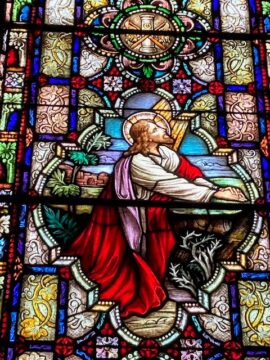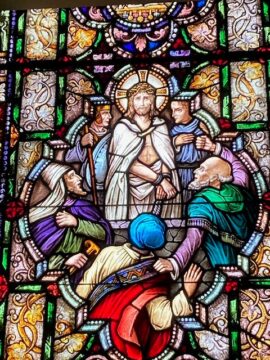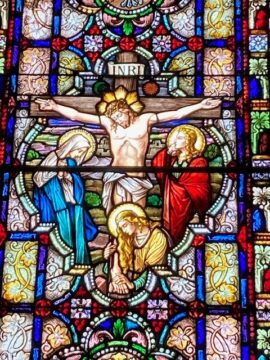Franciscan Friar Fr. Paul Gallagher reflects on the Gospel of Passion Sunday. Can you talk to God now about the cross in your life, the cross of Jesus, your cross, or the crosses in the lives of others around the world or in your neighborhood?
The content is edited by Franciscan Sister of Christian Charity Sister Anne Marie Lom and Joe Thiel. The excerpts from the Sunday readings are prepared by Joe Thiel. To read or download the complete pdf with excerpts for your prayer, please click here Franciscan Gospel Reflection April 2 2023. Excerpts are from the Lectionary for Mass for Use in the Dioceses of the United States of America, second typical edition © 2001, 1998, 1997, 1986, 1970 Confraternity of Christian Doctrine, Inc., Washington, DC. Used with permission. All rights reserved. No portion of this text may be reproduced by any means without permission in writing from the copyright owner. Photos: Holy Spirit Parish, Stevens Point, Wisconsin. Come and see these beautiful stained glasses images in-person this Holy Week in this faith-filled community.
Matthew 26:14-27:66 [or Mt 27:11-54 shorter from]
Background:
 The earliest Christian accounts of the death of Jesus are Paul’s simple and direct statements. “For I handed on to you as of first importance what I also received: that Christ died for our sins in accordance with the scriptures; that he was buried; that he was raised on the third day in accordance with the scriptures; that he appeared to Cephas, then to the Twelve. After that, he appeared to more than five hundred brothers at once …” (1 Corinthians 15:3-6) Paul’s statement may seem stark compared to Matthew’s passion narrative that is read as the Gospel. Paul’s emphasis is clearly on the resurrection. Crucifixion was reserved for the worst scoundrels and was an embarrassment to the early Christians. It took many years of reflection for the Christian community to make sense of the passion. Matthew’s community seems to be largely a Jewish community focused on Jesus as fulfilling the Hebrew Scriptures, especially Psalms 22 and 69, and texts from the great prophet Isaiah. (Italics have been added to highlight those texts where Matthew is telling his readers that the event fulfills what had been written about the Messiah.) Mark’s passion is similar to Matthew’s in focus. Luke and John focus much more on the discourse of Jesus throughout the events. John’s account does not even include a Last Supper narrative but instead a kind of farewell address that contains instructions for the disciples and a deep, personal prayer.
The earliest Christian accounts of the death of Jesus are Paul’s simple and direct statements. “For I handed on to you as of first importance what I also received: that Christ died for our sins in accordance with the scriptures; that he was buried; that he was raised on the third day in accordance with the scriptures; that he appeared to Cephas, then to the Twelve. After that, he appeared to more than five hundred brothers at once …” (1 Corinthians 15:3-6) Paul’s statement may seem stark compared to Matthew’s passion narrative that is read as the Gospel. Paul’s emphasis is clearly on the resurrection. Crucifixion was reserved for the worst scoundrels and was an embarrassment to the early Christians. It took many years of reflection for the Christian community to make sense of the passion. Matthew’s community seems to be largely a Jewish community focused on Jesus as fulfilling the Hebrew Scriptures, especially Psalms 22 and 69, and texts from the great prophet Isaiah. (Italics have been added to highlight those texts where Matthew is telling his readers that the event fulfills what had been written about the Messiah.) Mark’s passion is similar to Matthew’s in focus. Luke and John focus much more on the discourse of Jesus throughout the events. John’s account does not even include a Last Supper narrative but instead a kind of farewell address that contains instructions for the disciples and a deep, personal prayer.
The manner of Jesus’ death raised difficult questions for the early Christian community. How could God’s anointed be treated so shamefully? Could God not have done something to prevent this from happening? If God could have done something, why did God not do something to prevent Jesus’ crucifixion? Jesus’ death was a scandal, one that most Jews could not accept as the way God would choose to act. Therefore, to seriously consider Jesus as the long-awaited messiah was extremely difficult.
One of the ways Matthew deals with these questions is to make it clear that Jesus, who is the faithful servant of God, has been falsely accused. In the opening verses of today’s text, Jesus’ own disciple, Judas, receives payment to hand Jesus over. Judas next appears accompanied by a large crowd armed with swords and clubs and betrays Jesus with a kiss. The third and last time Judas is mentioned, he is back with the chief priests, seeking to correct his obvious mistake. When the chief priests refuse to cooperate with his change of heart, Judas hangs himself. Note that the money paid to Judas was blood money and therefore could not be returned to the temple treasury. The three times that Judas appears in Matthew’s passion highlight the fact that Jesus was falsely accused, showing that there were no valid accusations of any crime, let alone any crime that would merit crucifixion.
Another way that Matthew deals with the questions that arise from Jesus’ crucifixion is to portray him as the one who is completely in control of the situation. Jesus knows what is going to happen beforehand. He predicts that (1) the disciples will go into the crowded city of Jerusalem and find a man who had prepared a room for him and the disciples to celebrate the Passover, (2) one of his disciples will betray him, and (3) Peter will deny him. Jesus is also in control of his actions in the way he responds to people in roles of authority and power. Caiaphas and Pilate all appear to be driven by the situation. At times they even appear to be appealing to Jesus for some insight to make sense of the situation. Matthew also draws on the manly virtue of the day: that of bearing one’s fate in life without complaint. The only hint of complaint comes while Jesus is in prayer in the garden. But even then, Jesus prays that events unfold according to God’s will and not his own. As the passion narrative unfolds, Matthew reminds his community of references to their sacred tradition that suggest these events are unfolding as they were intended by God.
Matthew’s passion describes Jesus’ death not as the targeted fate of a naive radical holy man. Rather, Jesus is like every innocent and persecuted Hebrew who has experienced persecution, injustice, and misunderstanding. He is one like them. Jesus has taken the very worst treatment upon himself, and he has been totally faithful and completely innocent. The resurrection demonstrated, once and for all, the power of God to overcome all evil in the world.
Perhaps the struggle of the Hebrew people to accept Jesus as the Messiah is not so very different from our own. How could a loving God expect his beloved to endure such a painful and humiliating form of death? One problem with this type of question is that it seems to reflect only the perspective of Jesus being a human being. From the perspective of Jesus as God, the question might be asked: what is God revealing to us about his relationship to a world that is composed of people like the disciples, Peter, Judas, Caiaphas, Pilate, the chief priests, and so on?
Reflection Questions:
- What do you remember about the last time you experienced public suffering or humiliation?
- Reflect on your own experience of suffering. Are there times when suffering turns you inward and away from others? Are there other times when it is a source of compassion and connection with others? What are some other ways suffering affects you?
- Has suffering ever made you stronger?
- In the Gospel text, both Judas and Peter betrayed Jesus and regretted their actions later. What is the difference in the way that each of them dealt with their sorrow? How is Jesus affected by each of their betrayals?
- Have you ever wept because of your awareness of your sinfulness?
- Could you see yourself praying for the gift of tears as an expression of your sorrow?
- When Jesus prays that he be spared of the ordeal before him, what is he revealing to you about the nature of his relationship to the Father, and the Father’s relationship to Jesus?
- What is Jesus revealing to you about his relationship to the Father when he cries out on the cross? What is the Father revealing to you about the Father’s relationship to Jesus?
- Where are the crosses in your life? With what attitude do you deal with them?
- Can you talk to God now about the cross in your life, the cross of Jesus, your cross, or the crosses in the lives of others around the world or in your neighborhood?


